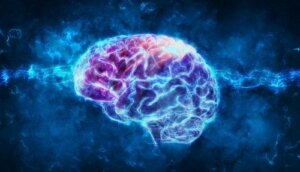Good Eating Habits to Encourage Cognitive Performance


Written and verified by the nutritionist Silvia Zaragoza
Cognitive performance is related to the correct development of the brain during pregnancy. This is where nutrition plays a key role. We should note that one of the essential nutrients, iodine, is supplemented. But before we get down to business, here’s a quote for you to think about.
“Intelligence is the ability to take and maintain a certain direction, adapt to new situations, and have the ability to criticize one’s own actions.”
– Alfred Binet –
Essential nutrients for good cognitive performance
Stay with us as we go through all the nutrients involved in brain functions, one by one.
Omega 3
The brain is made up of 60% fat and all the cells are covered with fat. For this reason, its intake is essential. However, they have to be quality fats, like omega 3 (linolenic acid, EPA and DHA). They’re found in nuts, oily fish (salmon, sardines, tuna, etc.), and seeds. Other food in this category are virgin olive oil and avocado.
In addition, cholesterol forms part of the myelin that surrounds the neurons in order to form a connection between them, and create a good brain performance. It’s also important to know that the lack of cholesterol prevents vitamin D from synthesizing and promotes aging, contributing to memory loss.
This doesn’t mean that we have to ingest it through food, since the body mainly synthesizes it in the liver. On the contrary, an excess is harmful, as it accelerates oxidation and deteriorates neuronal function.
Iron
The main symptom of iron deficiency is fatigue. As a consequence, it’s harder to concentrate, making learning difficult and altering a person’s mood. But the question is: what functions does this mineral perform other than transporting oxygen through the blood?

Iron contributes to nerve transmission, since it intervenes in the formation of the myelin layer and regulates the production of neurotransmitters, which are indispensable for memory, emotional responses and coordination.
So, having optimal iron reserves from a young age prevents cognitive decline throughout life. It’s found both in foods of animal origin, such as fish, seafood (mussels, clams, etc.) and meat, and in those of vegetable origin, such as legumes, green leafy vegetables, and nuts.
However, the degree of absorption is lower in vegetables due to the presence of sequestering agents, such as phytates and oxalates. To inactivate them, it’s recommended that you soak, boil, or roast these foods, and even let them sprout. In addition, when consumed with citrus fruits or peppers, which are a source of vitamin C, you’ll achieve greater absorption.
Antioxidants
Zinc stands out especially, and this mineral intervenes in numerous reactions among which the neuronal activation stands out. We can find it in fish, seafood, brewer’s yeast and whole grains, such as oats. It has also been seen that polyphenols present in fruit and vegetables contribute to normal brain function.
Iodine
This is the basic compound of thyroid hormones that regulate our metabolism and help to prevent mental and growth retardation. That’s why it’s advisable to supplement it throughout pregnancy, as well as to promote the consumption of fish and seafood, dairy products, seaweed, and iodized salt.
Vitamin B12
The lack of this vitamin produces a lack of memory, loss of coordination, slowness of movement, paresthesia, and lower cognitive performance. It’s irreversible when not treated early enough.
We only find it in food of animal origin, and so people who follow a vegetarian or vegan diet must supplement weekly. The dose depends on age, as can be seen in the following table.
| Age Recommended | Weekly Dose |
| 6-11 months | 400µg |
| 1 – 3 years | 750µg |
| 4 – 8 years | 1000µg |
| 9 – 13 years | 1500µg |
| > 14 years | 2000µg |
Source: VeganHealth.org-Jack Norris
Exercise and cognitive performance
Exercising at least 3 times a week helps maintain good physical, metabolic, bone, and mental health. With the youngest members of the household, it encourages teamwork, concentration, attention, and memory. The ideal method is to combine cardio activities (such as running, cycling or dancing) with strength-based activities.

Other factors involved in cognitive performance
So far we’ve mentioned lifestyle factors, but there are other ideal activities, such as:
- Reading. Choose a topic that you like. You don’t have to buy the books; you can go to the library or borrow them from a friend or relative.
- Crafts. These encourage creativity, patience and dexterity.
- Going to a museum, the cinema, or other places that are intellectually challenging.
- Doing hobbies.
Enemies of cognitive performance
As with our health, there are also factors that alter cognitive development.
Sugar and refined cereals
Currently, many people exceed the WHO’s recommended dose of 5-10% of these products, and this can promote the onset of diabetes, obesity, and excess weight. They’re a fast source of energy, and so, after 2-3 hours of consuming them, hunger appears again.
In addition to this, if these products are consumed regularly, then resistance to insulin, which is the hormone that regulates blood sugar levels, can occur. So, the less you consume these products, the better. The only cases which can justify their consumption would be hypoglycemia or elite sportsmen and women who are involved in intense and prolonged physical activity, such as a marathon.
Trans fats
These have a negative impact on cardiovascular health. We can find them in baked products such as cookies, snacks, chocolate pastes, and other sweets and pastries.
Salt
80% of the products we consume daily are rich in salt, which means that the maximum recommended dose of 3g is exceeded. This is why the amount of salt in snacks, tins and bread has been reduced over the last 10-15 years or so.
Alcohol and other drugs
Experts discourage the consumption of these products because it accelerates cognitive decline. This is despite the fact that drinking alcohol is considered to be a normal practice, even when the harmful effects are scientifically-proven. There’s no such thing as zero risk.
In conclusion, a healthy lifestyle from pregnancy onwards is essential in order to promote good cognitive performance. This has an influence on our children, especially in their student years. For that reason, you shouldn’t forget to encourage intellectually stimulating activities.
Cognitive performance is related to the correct development of the brain during pregnancy. This is where nutrition plays a key role. We should note that one of the essential nutrients, iodine, is supplemented. But before we get down to business, here’s a quote for you to think about.
“Intelligence is the ability to take and maintain a certain direction, adapt to new situations, and have the ability to criticize one’s own actions.”
– Alfred Binet –
Essential nutrients for good cognitive performance
Stay with us as we go through all the nutrients involved in brain functions, one by one.
Omega 3
The brain is made up of 60% fat and all the cells are covered with fat. For this reason, its intake is essential. However, they have to be quality fats, like omega 3 (linolenic acid, EPA and DHA). They’re found in nuts, oily fish (salmon, sardines, tuna, etc.), and seeds. Other food in this category are virgin olive oil and avocado.
In addition, cholesterol forms part of the myelin that surrounds the neurons in order to form a connection between them, and create a good brain performance. It’s also important to know that the lack of cholesterol prevents vitamin D from synthesizing and promotes aging, contributing to memory loss.
This doesn’t mean that we have to ingest it through food, since the body mainly synthesizes it in the liver. On the contrary, an excess is harmful, as it accelerates oxidation and deteriorates neuronal function.
Iron
The main symptom of iron deficiency is fatigue. As a consequence, it’s harder to concentrate, making learning difficult and altering a person’s mood. But the question is: what functions does this mineral perform other than transporting oxygen through the blood?

Iron contributes to nerve transmission, since it intervenes in the formation of the myelin layer and regulates the production of neurotransmitters, which are indispensable for memory, emotional responses and coordination.
So, having optimal iron reserves from a young age prevents cognitive decline throughout life. It’s found both in foods of animal origin, such as fish, seafood (mussels, clams, etc.) and meat, and in those of vegetable origin, such as legumes, green leafy vegetables, and nuts.
However, the degree of absorption is lower in vegetables due to the presence of sequestering agents, such as phytates and oxalates. To inactivate them, it’s recommended that you soak, boil, or roast these foods, and even let them sprout. In addition, when consumed with citrus fruits or peppers, which are a source of vitamin C, you’ll achieve greater absorption.
Antioxidants
Zinc stands out especially, and this mineral intervenes in numerous reactions among which the neuronal activation stands out. We can find it in fish, seafood, brewer’s yeast and whole grains, such as oats. It has also been seen that polyphenols present in fruit and vegetables contribute to normal brain function.
Iodine
This is the basic compound of thyroid hormones that regulate our metabolism and help to prevent mental and growth retardation. That’s why it’s advisable to supplement it throughout pregnancy, as well as to promote the consumption of fish and seafood, dairy products, seaweed, and iodized salt.
Vitamin B12
The lack of this vitamin produces a lack of memory, loss of coordination, slowness of movement, paresthesia, and lower cognitive performance. It’s irreversible when not treated early enough.
We only find it in food of animal origin, and so people who follow a vegetarian or vegan diet must supplement weekly. The dose depends on age, as can be seen in the following table.
| Age Recommended | Weekly Dose |
| 6-11 months | 400µg |
| 1 – 3 years | 750µg |
| 4 – 8 years | 1000µg |
| 9 – 13 years | 1500µg |
| > 14 years | 2000µg |
Source: VeganHealth.org-Jack Norris
Exercise and cognitive performance
Exercising at least 3 times a week helps maintain good physical, metabolic, bone, and mental health. With the youngest members of the household, it encourages teamwork, concentration, attention, and memory. The ideal method is to combine cardio activities (such as running, cycling or dancing) with strength-based activities.

Other factors involved in cognitive performance
So far we’ve mentioned lifestyle factors, but there are other ideal activities, such as:
- Reading. Choose a topic that you like. You don’t have to buy the books; you can go to the library or borrow them from a friend or relative.
- Crafts. These encourage creativity, patience and dexterity.
- Going to a museum, the cinema, or other places that are intellectually challenging.
- Doing hobbies.
Enemies of cognitive performance
As with our health, there are also factors that alter cognitive development.
Sugar and refined cereals
Currently, many people exceed the WHO’s recommended dose of 5-10% of these products, and this can promote the onset of diabetes, obesity, and excess weight. They’re a fast source of energy, and so, after 2-3 hours of consuming them, hunger appears again.
In addition to this, if these products are consumed regularly, then resistance to insulin, which is the hormone that regulates blood sugar levels, can occur. So, the less you consume these products, the better. The only cases which can justify their consumption would be hypoglycemia or elite sportsmen and women who are involved in intense and prolonged physical activity, such as a marathon.
Trans fats
These have a negative impact on cardiovascular health. We can find them in baked products such as cookies, snacks, chocolate pastes, and other sweets and pastries.
Salt
80% of the products we consume daily are rich in salt, which means that the maximum recommended dose of 3g is exceeded. This is why the amount of salt in snacks, tins and bread has been reduced over the last 10-15 years or so.
Alcohol and other drugs
Experts discourage the consumption of these products because it accelerates cognitive decline. This is despite the fact that drinking alcohol is considered to be a normal practice, even when the harmful effects are scientifically-proven. There’s no such thing as zero risk.
In conclusion, a healthy lifestyle from pregnancy onwards is essential in order to promote good cognitive performance. This has an influence on our children, especially in their student years. For that reason, you shouldn’t forget to encourage intellectually stimulating activities.
All cited sources were thoroughly reviewed by our team to ensure their quality, reliability, currency, and validity. The bibliography of this article was considered reliable and of academic or scientific accuracy.
- Griselda Herrero Martín (2018). Alimentación saludable para niños geniales. 1ªEdición, España. Editorial Amat.
- Castelli, V; Grassi, D; Bocale, R; Angelo, M; Antonosante, A, Cimini,A et al. (2018). Diet and brain health: Which role for polyphenols? Curr Pharm Design, 24:227-38.
- Pribis, P y Shukitt-Hale, B. (2014). Cognition: the new frontier for nuts and berries. Am J Clin Nutr, 100: 347-52.
- Poulose, S; Miller, M; Scott, T y Shukitt-Hale, B. (2017). Nutritional factors affecting adult neurogenesis and cognitive function. Am Soc Nutr, 8:804-11.
- Correa-Burrows,P; Burrows, R; Blanco,E; Reyes,M y Gahagan S. (2016). Nutritional quality of diet and acadmic performance in Chilean students. Bull World Health Organ, 94:185-92.
- Martínez García, R; Jiménez Ortega, A; López-Sobaler, A y Ortega, R. (2018). Estrategias nutricionales que mejoran la función cognitiva. Nutr Hosp, 35(6): 16-9.
- Francis,S y Stevenson, R. (2013). The longer-term impacts of Western diet on human cognition and the brain. Appetite, 63:119-28.
- Correa-Burrows, P; Burrows,R; Orellana,Y y Ivanovic,D. (2014). The relationship between unhelathy snacky at school and academic outcomes: a population study of Chilean schoolchildren. Public Helath Nutrition, 18(11): 2022-30.
- Masana,M; Koyanagi, A; Haro,JM y Tyrolovas, S. (2017). n-3 Fatty acids, Mediterranean diet and cognitive function in normal aging: A systematic review. Exp Gerontol, 91: 39-50.
- Hapaala, E; Eloranta,A; Venälänen, T; Schwab U; Lindi, V y Lakka, T. (2015). Associations of diet quality with cognition in children-The physical activity and nutrition health study. Br J Nutr, 114(7): 1080-7.
This text is provided for informational purposes only and does not replace consultation with a professional. If in doubt, consult your specialist.








